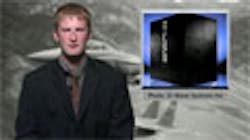Are quantum computers viable for military and aerospace applications?
NASHUA, N.H., 10 July 2012. In this week's Military & Aerospace Electronics Report Skyler Frink discusses the challenges of quantum computing and their potential as a tool for military & aerospace applications.
Transcript:
This is the Military & Aerospace Electronics Report, I'm Skyler Frink.
Quantum computers have always sounded like a science fiction invention, though there are real quantum computers, as elusive as they may be. As previously mentioned, there are quantum computers out and about for people to purchase, but they have extremely limited uses thanks to the very few quantum algorithms that are out there.
Without a quantum algorithm there is no real different between a qubit and a normal bit. If you can't make use of a quantum computer's ability to be zero, one or any superposition of those two states you just have a very expensive computer that doesn't work properly when observed.
Raytheon may be answering the question of whether quantum computing will have real applications for the military. Aside from the obvious appeal from a cyber security standpoint, quantum computers are able to completely obliterate the ever-popular RSA encryption used for encryption over open networks, what uses could quantum computing have for the military and aerospace industries?
Quantum algorithms are far from easy to create, and quantum computers themselves are such fragile machines; you can't actually see what's going on inside of them or else they will fail to work properly according to quantum physics, and the box itself needs to be very carefully protected at this point for everything to function. The benefits are all worth the difficulty, however. If quantum computers become stable and are found to be viable, we could see a time when we aren't held back by technology, but technology is held back by us (or at least our inability to write programs that use the technology to its full potential).
It's hard to imagine a helicopter with an embedded quantum computer in it, but we're on our way to discovering whether or not that's feasible!
For the Military & Aerospace Electronics Report, I'm Skyler Frink.
